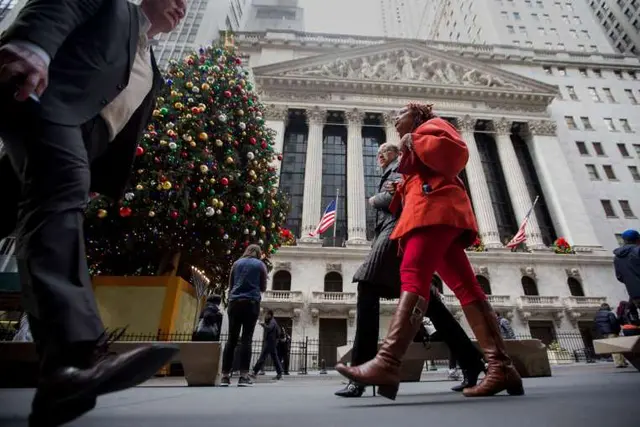(THESTRAITTIMES)TheFederalReserve'spolicymakersmetforthefinaltimethisyearonWednesday(Dec16)andannouncedthefirstUSinterestratehikesinceJune2006,andsevenyearsafteritpusheditsbenchmarklendingratetozerotobattletheglobalfinancialcrisisandtheGreatRecessionthatfollowed.
HigherUSinterestrateswillhavefar-reachingimplicationsforeverycorneroftheworldeconomy,fromyourhomeandcarloans,companiesandgovernments'borrowingcosts,tothevalueofcurrenciesandcommodities.
Here'swhatyouneedtoknowinsixpoints:
1.WhatdidtheFeddo?
TheUScentralbankraiseditsbenchmarkfederalfundsratebyaquarterof1percentagepointto0.25-0.50percent,sayingtheUSeconomyisgrowingatamoderatepaceandshouldacceleratenextyear.
Themovewaswidelyexpectedbutneverthelessmarkedtheendofanera-almostadecadelong-inwhichtheFedpumpedtrillionsofcheapdollarsintotheUSeconomytofuelwhatturnedouttobeaverylongrecovery.
2.Whyhikeratesnow?
TotheFed,arateincreaserepresentsavoteofconfidenceintheUSeconomyafteralong,unevenrecoveryfromtheglobalfinancialcrisisanddeeprecession.
FedofficialsnowseeaUSeconomythathasmadeenoughprogresstowarrantaslowretreatfromcheapmoney.TheUSjoblessratehashalvedto5percentinNovemberfrom10percentin2009andeconomyisgrowingatrobust2.1percentannualrate.
InflationisstillbelowtheFed's2percentgoalbutofficialsbelieveitwillrisein2016asslackinthejobmarketdiminishesandoilpricesstabilise.
EconomistsalsoargueitishightimeUSrateswereraisedtopreventexcessiveconsumerborrowingandbubblesemerginginthehousingmarketandothertypesofassets.
3.Whatdidthefedsayaboutthefutureratehikes?
Itstressedinmanywaysthattheywillbe"gradual".
-Initsstatementontheraterise,theFedsaidit"expectseconomicconditionswillevolveinamannerthatwillwarrantonlygradualincreasesinthefedfundsrate".Tohammerhomethispoint,itaddedinasecondplaceinthestatementthatitanticipated"gradualadjustments"inrates.
-TheFedalsostressedthatwhenitmovesnextwilldependonUSinflation.Initsstatement,theFedsaiditwould"carefullymonitor"actualandexpectedprogresstowardsitsinflation-implyingitwillbereluctanttoraiseratesagainunlessitseesinflationactuallymovingup.
-TheFedalsonotedinitsstatementthatitwillnotshrinkitsportfolioofmortgageandTreasurysecurities-anotherwayofpumpingcheapmoneyintotheeconomy-untilrateincreaseswere"wellunderway".TheFedhasassetsofUS$4.5trillion(S$6.3million)andshrinkingtheportfoliocouldshakeupmarkets.
-DrYelleninapressconferencesaidthebenchmarkrate"remainsaccommodative",whichisFedjargonforalevellowenoughtostimulateeconomicgrowth.
4.Sohowmanyratehikescanweexpect?
Fourquarter-percentage-pointrateincreasesin2016,fourin2017andthreeorfourin2018.
ThisisgoingbynewprojectionsofwhatFedofficialsexpecttheirbenchmarkratetocreepupto-1.375percentbytheendof2016,2.375percentbytheendof2017and3.25percentbyend-2018.
Note:ThisisaslowerpacethanprojectedbyFedofficialsinSeptemberandmuchslowercomparedtoearlierseriesofFedrateincreases.Inthe2004-06period,forexample,theFedraisedrates17timesinsuccession.
5.Whydoesausratehikemattertotherestoftheworld?
Astheworld'slargesteconomy,whathappensintheUSripplesouttoprettymucheverywhere.
WhiletheFedfundsrateiswhatUSbankspayeachotherforovernightloans,itsetsthebasisforlonger-termratesthroughouttheglobalfinancialsystemfromhomeandcarloanstocorporateloansandnationaldebt.
Singaporehomeownerswithmortgagesorbusinesseswithcorporateloanswillneedtofactorinhigherpayments.
Ontheplusside,saverswhohaveseenyearsofverylowdepositratesarelikelytobebetterrewarded.
6.Whowillbemostaffected?
Thosewhoborrowedmostheavilywillbemostaffected.EconomistsaremostconcernedforemergingmarketslikeTurkey,BrazilandRussiawhosecompaniesandgovernmentshaveborrowedheavilyinUScurrencyandwillnowfindithardertoserviceexistingdebtandattractnewinvestment.
AneraofrisingUSinterestratesislikelytostrengthentheUSdollar.ManycompaniesandcountriesinemergingmarketshaveraiseddebtinUSdollarsbutearnmuchoftheirincomeinalocalcurrencysoservicingtheirdebtwillbecomemoreexpensiveastheUSdollarrises.
RisingUSinterestratesalsoaffecthowinvestorsviewrisk.IftheycanearnamoreattractivereturnoninvestmentsintheUS,theymightshuninvestmentsintheseriskiernations.
Higherinterestratesalsocomeatabadtimeformanyemergingeconomies,particularlythosethatrelyonexportingcommodities.Thepriceofoil,metalsandagriculturalcommoditieshaveplungedsocompaniesandgovernmentscouldfacehigherborrowingcostsatatimewhenearningsfromminingandagriculturearefalling.
AndbecausecommoditiestendtobepricedinUSdollars,anyappreciationislikelytotriggerfurthercommoditypricefalls.
InvestorshavealreadywithdrawnanetUS$500billionfromemergingmarketsin2015,thefirstannualoutflowindecades.ThequestionnowiswhethertheFedmoveprovokesastampede.
Manyemerging-marketcurrenciesarealreadyunderpressureasinvestorsworryaboutthehealthofthoseeconomies.
Ontheupside,thestrongerUSdollarmightbegoodforEuropeanandAsianeconomiesasitmeansexportstotheUSwillbecheaper.
 简体中文
简体中文



